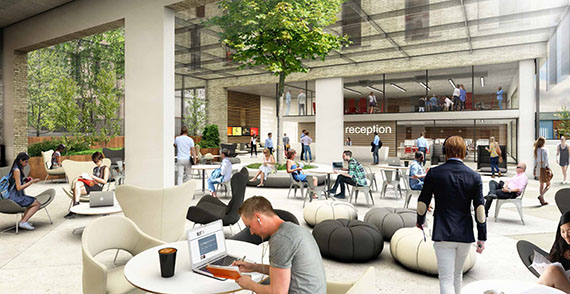Working in an office with high sustainability credentials is more important to corporate employees than financial incentives such as receiving an annual bonus.
That was among the key findings of a survey commissioned by Brookfield Properties and Foster + Partners, in which more than a third of 3,400 respondents across the UK put a sustainable workspace at the top of their priority list, ahead of the 29% prioritising an annual bonus.
The report, Design of the workplace, found that 30% of office workers would consider leaving their job if their company failed to show a commitment to sustainability, including in the design of office space, their content and practices and supply chains. This number rose to 35% in those aged 18-29.
Environmentally-friendly, well-designed workspaces appear to lead to greater productivity, calm, wellbeing and to staff feeling valued, with three-quarters saying they feel more productive and creative in the right office environment than when working from home.
Some 90% of employees believe that sustainable workspace design is beneficial for the planet and their own wellbeing, and 83% of respondents who are less than a decade into their career said it is important that their company operates in a climate-aware manner. Job satisfaction in offices with top ESG credentials are higher, with 93% of people working in an environmentally friendly office saying they feel happy in their job, compared to 55% among those working in non-environmentally-friendly offices.
New workplace requirements have emerged since the Covid-19 pandemic, as employers look for ways to “earn the commute”. This has led to greater selectivity from employers and employees over the offices that foster the right working conditions and company values.
Respondents highlighted the need for good quality air ventilation (cited by 48%), natural ventilation (36%), natural lighting (46%), high speed internet connectivity (43%), good temperature control (37%), recycling facilities (35%) and adaptable desks and chairs (34%).
Dan Scanlon, executive vice president at Brookfield Properties, said: “There is a strong desire from companies and individuals to understand the carbon footprint of their workplace, and importantly how they can make meaningful reductions and deliver upon their own ESG goals.”
Scanlon added: “This report allowed us to spotlight the design of the workplace specifically and how employers can do their bit for the planet and retain a happier, productive workforce in the process.”
Dan Sibert, senior partner at Foster + Partners, said: “The workplace of the future is about creating spaces that support a greater range of activities and diverse working practices, while focusing on wellbeing and offering people a sense of community. Allied to this is a thorough analysis of the building’s carbon footprint – both operational and embodied carbon.
“Research data shows that the fit-out of a typical building has far greater carbon emissions than its structure. Using technology, we can isolate components to see how those choices impact the carbon footprint of the project. We have developed the idea of a ‘timeless fit-out’ that can change over time and adapt to the evolving nature of the workplace, using higher quality materials that last longer. The result is a sustainable, human-centric workplace, that is equipped to face the challenges of the future.”
To send feedback, e-mail chante.bohitige@eg.co.uk or tweet @bohitige











